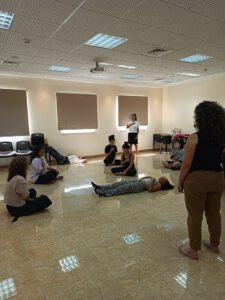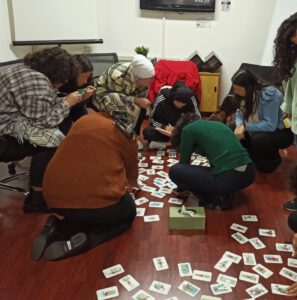The follow-up weekend was originally planned as a binational meeting – a joint long weekend for all participants of the women*seminar 2019. Then the political situation changed and due to the riots between Israelis and Palestinians inside Israel and the war with Gaza, a joint meeting was not feasible and was postponed indefinitely.
After discussions in the overall team of the women*seminar, the respective coordinators decided to organise uni-national meetings.
During the Corona pandemic, most of the Palestinian participants had a difficult time: the fear of contracting the virus was compounded by the socio-political situation and the economic situation, which was further exacerbated by the pandemic. Many of the women* were themselves affected by dismissals or have family members who lost their jobs due to the pandemic. Economic pressure and price increases of daily necessities added up to the already existing uncertainties about their future due to the occupation situation.
„The basic idea of the follow-up weekend was, on the one hand, to exchange ideas about future activism and to develop shared ideas and, on the other hand, to give the women* options for action to ventilate, to release frustrations and to regain new energy. The movement workshop with Nancy A.* under the motto: My movement is my story aimed to focus on our bodies and express our emotions through movement, but also through creative methods such as drawing and speaking in order to regain strength and inner power,“ explains the Palestinian coordinator Rana K.*.

The joint weekend began late on Thursday afternoon with an introduction round and playful exercises to break the ice and become familiar with each other again; many of the participants had not seen each other during the Corona months. By this time it became already clear how emotionally exhausting the coming days would be. Many women* were frustrated and depressed: One of the participants had developed depression out of fear of contracting Covid and had not left her house for a year; to this day she finds it difficult to go outside. Others had lost their jobs and were now in a difficult financial situation. In addition, there were other social problems, such as harassment and public exposure, which the participants had to face in the last months and which made them angry and sad at the same time. Akila E.* told about a friend who had shared a post on social media showing her being harassed by a shopkeeper. Akila then shared the post as well to support the friend. Coincidentally, the harasser turned out to be a distant relative of Akila’s who, in response to the Facebook post, threatened her family and eventually kidnapped her father, forcing him to apologise for her behaviour in a social media statement. Because of this incident, Akila was very upset.
Another participant posted a photo of herself in sportswear on Instagram. This picture was deemed too revealing by people around her, so they forwarded it to her family, who then beat her and locked her in the house.
Many participants reported violent attacks and quarrels in the family due to different ideas of life – situations that have also intensified in Palestine during the pandemic.
While everyone appreciated the weekend together with the opportunity to share, participants‘ opinions differed regarding the movement workshop. Carmen F.* shares her experience: „After all the stress and overwhelming emotions, the weekend was the right format at the right time, at least for me. I was aware that I had had a really difficult time personally, but I was not aware of the emotions I was suppressing or my unhealthy coping mechanisms until the workshop. Normally I am a talkative person who can start a conversation about any topic and go on forever if needed. But when asked to talk about my emotions, I block. I don’t like to talk about my feelings. (…) In such situations [like in the workshop] you open up. It’s not a must, of course, but sometimes it’s necessary. Comfort zones are comfortable, but getting out of the comfort zone ultimately leads to emotional well-being. First, though, you have to go through the uncomfortable part.“ Carmen changed quite a bit after the seminar in summer 2019. Until then, she was very shy – now she stands up for her opinions and views and also talks about them. Already on the flight back from Germany, for example, she decided not to wear a hijab in the future, which she did until then because her family had asked her to. After the seminar, she refused and confronted her family.
Zahra I.* also speaks about the weekend: „The fact that we come from different backgrounds and perspectives made me feel insecure before the meeting. I have never opened up in front of a group before, which also made the meeting a challenge for me. I’m glad that we can find common ground and overcome our differences. That’s why I enjoy meeting with the group and sharing more than I normally do.“
However, Zahra expected more from the movement workshop: „I had high expectations from this workshop. In general, it was good, but it did not meet my expectations. I would have liked more movement to feel freer- and less drawing.“
Zahra I. also changed because of the seminar: now she listens to others, talks to people who have different views and takes the opinions of others more seriously. In general, she is very strict with herself and with others, in her way of life, but also in her views about society. During the 2019 seminar, she had briefly considered dropping out of the seminar for fear of normalisation, but now she would like her younger sister to participate in a dialogue seminar in the future.
Rana K. reports that many of the participants had hoped for more depth from the movement workshop: „But considering the emotional situation of the participants, that would not have been responsible. The women* came to the weekend with a lot of expectations. They were looking for that one ‚magic‘ workshop that would make them feel better. However, doing very intensive exercises to open up deep processes that I would then not have been able to pick up again within the framework of the weekend would have been irresponsible.“

However, the reflection round after the workshop in the evening proved, deeper processes had been set in motion than expected: „On Saturday morning we started talking about planning for the future. In terms of joint activism, I had planned a talk on the Bedouin struggle against land confiscation, but this had to be postponed. Everyone was very sad and there was a lot of crying,“ says Rana K. Without further ado, the programme was rearranged and the rest of the day was used to catch the participants emotionally and to pick them up again, so that most of the participants could leave the weekend strengthened. After all, emotional care work is also an important part of sustainable activism.
From this follow-up meeting came the desire to hold another weekend workshop on the topic of psychosocial self-care, which would give participants tools and strategies to deal with their own situations emotionally and provide further offers and information on other places where women* can turn to with their concerns if needed. This workshop took place in mid-March 2022.
